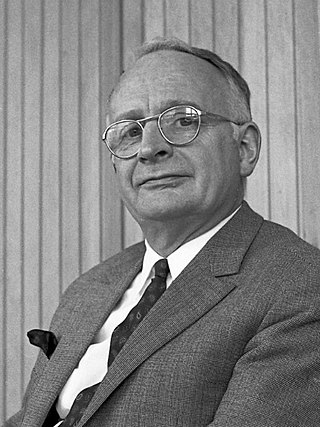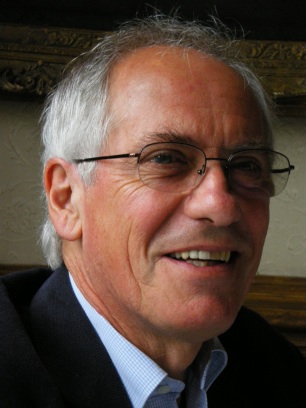
Niklaus Emil Wirth is a Swiss computer scientist. He has designed several programming languages, including Pascal, and pioneered several classic topics in software engineering. In 1984, he won the Turing Award, generally recognized as the highest distinction in computer science, for developing a sequence of innovative computer languages.
Andrey Petrovich Yershov was a Soviet computer scientist, notable as a pioneer in systems programming and programming language research.

Stephen Richard "Steve" Bourne is an English computer scientist based in the United States for most of his career. He is well known as the author of the Bourne shell (sh), which is the foundation for the standard command-line interfaces to Unix.

Adriaan "Aad" van Wijngaarden was a Dutch mathematician and computer scientist. Trained as a mechanical engineer, Van Wijngaarden emphasized and promoted the mathematical aspects of computing, first in numerical analysis, then in programming languages and finally in design principles of such languages.

Nobuo Yoneda was a Japanese mathematician and computer scientist.
David A. Turner is a British computer scientist. He is best known for designing and implementing three programming languages, including the first for functional programming based on lazy evaluation, combinator graph reduction, and polymorphic types: SASL (1972), Kent Recursive Calculator (KRC) (1981), and the commercially supported Miranda (1985). Miranda had a strong influence on the later Haskell.

Friedrich Ludwig "Fritz" Bauer was a German pioneer of computer science and professor at the Technical University of Munich.
Eric "Rick" C. R. Hehner is a Canadian computer scientist. He was born in Ottawa. He studied mathematics and physics at Carleton University, graduating with a Bachelor of Science (B.Sc.) in 1969. He studied computer science at the University of Toronto, graduating with a Master of Science (M.Sc.) in 1970, and a Doctor of Philosophy (Ph.D.) in 1974. He then joined the faculty there, becoming a full professor in 1983. He became the Bell University Chair in software engineering in 2001, and retired in 2012.
John Edward Lancelot Peck was the first permanent Head of Department of Computer Science at the University of British Columbia (UBC). He remained the Head of Department from 1969 to 1977.

Richard Simpson Bird was an English computer scientist.
Lambert Guillaume Louis Théodore Meertens or L.G.L.T. Meertens is a Dutch computer scientist and professor. As of 2020, he is a researcher at the Kestrel Institute, a nonprofit computer science research center in Palo Alto's Stanford Research Park.
Thomas Stephen Edward Maibaum Fellow of the Royal Society of Arts (FRSA) is a computer scientist.

Micha Sharir is an Israeli mathematician and computer scientist. He is a professor at Tel Aviv University, notable for his contributions to computational geometry and combinatorial geometry, having authored hundreds of papers.
Klaus Samelson was a German mathematician, physicist, and computer pioneer in the area of programming language translation and push-pop stack algorithms for sequential formula translation on computers.

Maurice Paul Nivat was a French computer scientist. His research in computer science spanned the areas of formal languages, programming language semantics, and discrete geometry. A 2006 citation for an honorary doctorate (Ph.D.) called Nivat one of the fathers of theoretical computer science. He was a professor at the University Paris Diderot until 2001.
Charles Carroll Morgan is an American computer scientist who moved to Australia in his early teens. He completed his education there, including a Doctor of Philosophy (Ph.D.) degree from the University of Sydney, and then moved to the United Kingdom in the early 1980s. In 2000, he returned to Australia.

Jeremy Gibbons is a computer scientist and professor of computing at the University of Oxford. He serves as Deputy Director of the Software Engineering Programme in the Department of Computer Science, Governing Body Fellow at Kellogg College and Pro-Proctor of the University of Oxford.
Eiiti Wada is a computer scientist and emeritus professor at the University of Tokyo and the Research Director of Internet Initiative Japan (IIJ), a computer network technology company. He is one of the creators of the Happy Hacking Keyboard.
Conor McBride is a Reader in the department of Computer and Information Sciences at the University of Strathclyde. In 1999, he completed a Doctor of Philosophy (Ph.D.) in Dependently Typed Functional Programs and their Proofs at the University of Edinburgh for his work in type theory. He formerly worked at Durham University and briefly at Royal Holloway, University of London before joining the academic staff at the University of Strathclyde.
Yanhong Annie Liu is a computer scientist and professor of computer science at Stony Brook University where she works on new programming languages, software systems, algorithms, program design, optimizing, analysis, and transformations, intelligent systems, distributed computing systems, and computer security.







